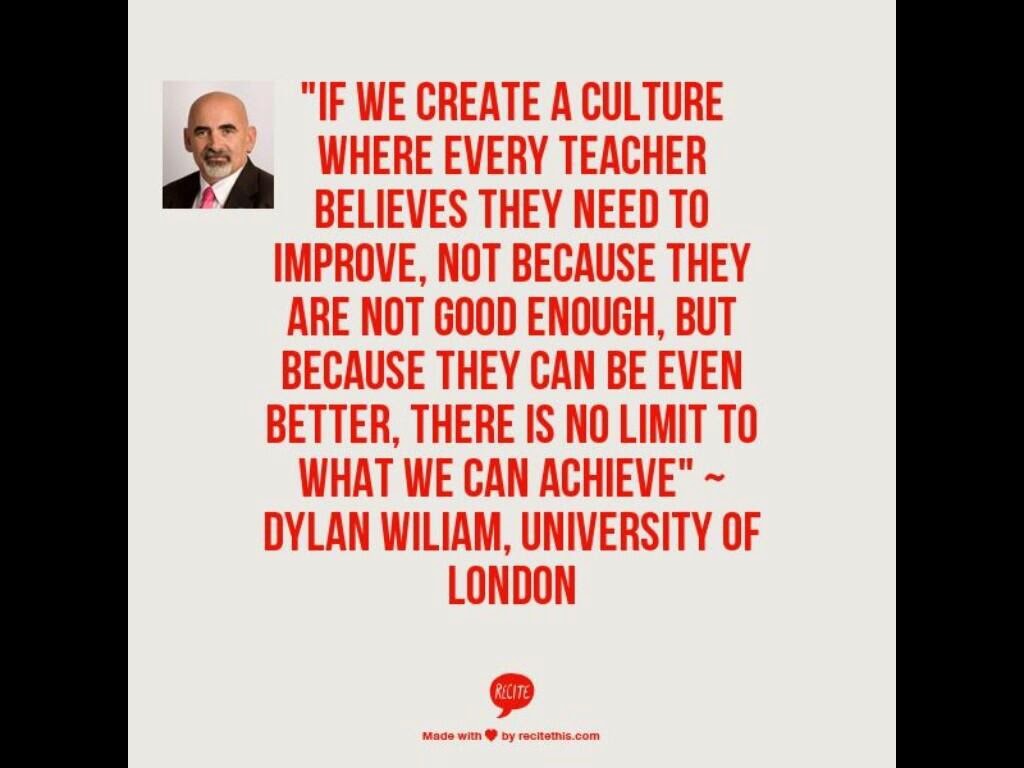Every teacher has his or her strengths. So
I ask you…what are your strengths? Would your team members agree with you? At a recent LeadMeet I listened to Cameron Paterson @cpaterso and Lou Deibe @ldeibe share their journey and strategies when coaching for collaboration. Soon after, my school kindly sent me to Hawker
Brownlow where coaching appeared to be a focus (or maybe I chose it to be?).
Learning from others on Twitter has developed my interest and furthered my belief that coaching is an effective practice that develops teachers professionally.
Thank goodness all teachers are not the
same! While this is great in one aspect, at times it can be difficult, as teams
needs to work collaboratively. These holidays I intend to focus on reading, discussing and learning more about coaching. As we know, we all have our strengths
but are we aware of areas that need developing? Who can help us learn more
about ourselves as teachers? Should it be our team members? Should it be our
administrators? Should it be a professional coach/outsider?
I think the one element that is missing is whoever it
is...there must be a strong level of trust. I believe trust needs to be established for
one to truly be open to learning about themselves professionally.
To confirm my definitions - ‘Coach'-to transform thinking, ‘Collaborate'-to form ideas, ‘Consult/Mentor'-to inform & ‘Evaluate'-to conform.
If you watch Simon Breakspear How do the innovative learning environments get created? you may understand why I visited some
members of my Professional Learning Network (PLN) in Canberra this week. I hope to provide a
snapshot of my ‘take-aways’.
Richardson @Borto74 @gregt39 @bingobarney @benmwhite86
- Developing life-long learners, not short-term outcomes
- Student growth is more than just data results
- Coaching is key! We need to invest in our teachers
- Invested teachers that are accountable drive school growth.
- Collective accountability-Teachers working collaboratively to achieve school goals
- Trust takes time and needs to be a priority
Brindabella School @MelanieSSpencer
- Teaching is research in action! More educators should formally record what they are doing & share with all stakeholders
- Learning spaces are created to provide collaborative, flexible working environments for students and teachers
- Connect the school and activities to the real world.
- Question when people say, “it’s always been done that way”
- Change mindsets-this may include administrators, teachers, parents and students. This takes time.
Dickson College @betchau
- Classes are provided for refugee students-great way for students and teachers to develop empathy
- The subjects in the ACT provides a plethora of choice
- I learnt about their wonderful architecture and engineering programs - which included the Unmanned Aerial Vehicles (UAV) program, robotics and I also saw 3D printers in action!
- Passionate teachers inspire passionate students
Gungahlin College @CraigMEdwards_
- Learning spaces are flexible and designed to promote collaboration
- Staff rooms and learning spaces are all ‘open’
- The teachers, technologies, resources and spaces enable students to engage and develop their love of learning
- The college continues to evolve and adapt to suit the needs of their students and learning contexts
 Ultimately being part of a team could mean your year level, stage, school, or #PLN. I don’t believe you can develop
professionally on your own. You need someone you trust to help you identify where
you need growth. But you also need a trusted someone to remind you of the awesome job
you are doing. I think we, as educators always look at our inadequacies but we
also need to celebrate our contributions to the education profession.
Ultimately being part of a team could mean your year level, stage, school, or #PLN. I don’t believe you can develop
professionally on your own. You need someone you trust to help you identify where
you need growth. But you also need a trusted someone to remind you of the awesome job
you are doing. I think we, as educators always look at our inadequacies but we
also need to celebrate our contributions to the education profession. Keep dreaming for yourself and your students.
Andrea
stringer_andrea

No comments:
Post a Comment